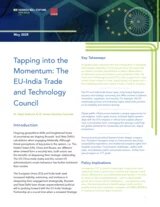POLICY BRIEF
Tapping into the Momentum: The EU-India Trade and Technology Council
May 2025
Dr. Rajat Kathuria & Dr. Amaia Sánchez-Cacicedo
Key Takeaways
As global power dynamics shift and competition in emerging technologies intensifies, the European Union (EU) and India are seeking strategic partnerships to reduce dependence on dominant actors and shape a more multipolar order. The TTC offers a platform to align on key issues related to trade, digital policy, and green tech—but translating intent into impact remains a work in progress.
.................................................
The EU and India both favour open, rules-based digital governance and strategic autonomy, but differ on how to balance innovation, regulation, and security. For example, the EU emphasizes privacy and individual rights, while India prioritizes accessibility and national security.
.................................................
Digital public infrastructure presents a unique opportunity for convergence.
India’s open-source, inclusive digital systems align with the EU’s interests in ethical and scalable alternatives to proprietary tech. Leveraging this synergy could help set global standards for trustworthy and democratic digital ecosystems.
.................................................
Structural and procedural barriers hinder deeper cooperation. Persistent divergent views on international data flows, sustainability regulations, and intellectual property rights limit tangible outcomes. Coordination challenges—within both sides, and between public and private sectors—further hampers progress on TTC goals.
Policy Implications
To make the Trade and Technology Council (TTC) a driver of meaningful cooperation, both sides must invest in governance reforms that improve coordination, effectiveness, and stakeholder participation. Focusing on areas of clear complementarity—such as digital public goods and trusted artificial intelligence —can generate early wins. International partners should support platforms that amplify voices from researchers, investors, and SMEs (MSMEs) to ensure an inclusive digital transition.
